

Home - Digital Preservation Coalition. Illustration by Jørgen Stamp digitalbevaring.dk CC BY 2.5 Denmark "Overall the improvements to the Handbook make it, in my opinion, one of the more useful and flexible tools for identifying, understanding and getting to grips with practical approaches to the varying challenges of digital preservation.
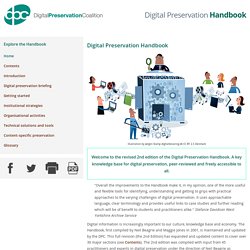
It uses approachable language, clear terminology and provides useful links to case studies and further reading which will be of benefit to students and practitioners alike. " Stefanie Davidson West Yorkshire Archive Service Digital information is increasingly important to our culture, knowledge base and economy. The Handbook, first compiled by Neil Beagrie and Maggie Jones in 2001, is maintained and updated by the DPC. Swipe table to see more detail You may re-use this material in English (not including logos) with required acknowledgements free of charge in any format or medium. Home - Digital Preservation Coalition. The Keepers Registry: Search. Keepers Extra. Duration August 2014 – July 2016 Summary Keepers Extra is a Jisc project in the area of continuing access and preservation of e-journals.
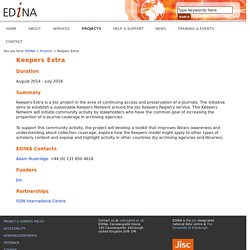
The initiative aims to establish a sustainable Keepers Network around the Jisc Keepers Registry service. This Keepers Network will initiate community activity by stakeholders who have the common goal of increasing the proportion of e-journal coverage in archiving agencies. To support this community activity, the project will develop a toolkit that improves library awareness and understanding about collection coverage, explore how the Keepers model might apply to other types of scholarly content and expose and highlight activity in other countries (by archiving agencies and libraries).
EDINA Contacts Adam Rusbridge: +44 (0) 131 650 4616 Funders Jisc Partnerships ISSN International Centre. Triggered Content – Portico. Publishers and libraries have entrusted tens of thousands of e-journals, e-books, and other content to Portico.
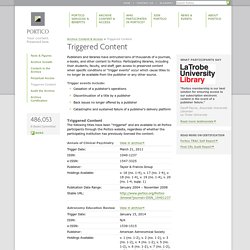
Participating libraries, including their students, faculty, and staff, gain access to preserved content when specific conditions or “trigger events” occur which cause titles to no longer be available from the publisher or any other source. Trigger events include: Cessation of a publisher’s operationsDiscontinuation of a title by a publisherBack issues no longer offered by a publisherCatastrophic and sustained failure of a publisher’s delivery platform The following titles have been “triggered” and are available to all Portico participants through the Portico website, regardless of whether the participating institution has previously licensed the content: Important Notes About Triggered Content The Portico delivery system accepts Open URL links. What we talk about when we talk about SafeNet. July 2015 marks the halfway point for the SafeNet project.
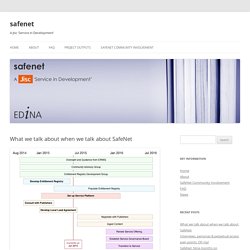
A lot of progress has been made towards developing a service that will provide value to the HE community. As we look forward towards the next reporting phase, one which involves significant outreach and negotiation efforts, our attention has focused on the need to produce a clear model of the service proposition by way of infrastructural components and stakeholders, with a demonstration of how those aspects will function and inter-relate. In our last blog post, we introduced project personas that emerged via discussions with UK HE librarians. Those discussions regularly explored the issues around post cancellation access in close detail, however interviewees found it harder to identify the shape of the tool or service that would address these problems. To this end the project team have spent time defining and illustrating who will do what and why they will do it as participants in the service.
Safenet. Jisc Futures has invested in Safenet, a two-year ‘service-in-development’ to improve assured continuity of access for UK HE institutions to the electronic journal articles for which they have paid.
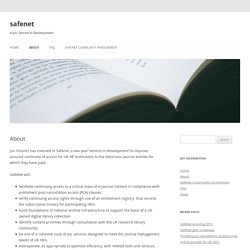
SafeNet will: facilitate continuing access to a critical mass of e-journal content in compliance with publishers’ post-cancellation access (PCA) clausesverify continuing access rights through use of an entitlement registry that records the subscription history for participating HEIs.build foundations of national archive infrastructure to support the basis of a UK owned digital library collectionidentify content priorities through consultation with the UK research library community.be one of a cohesive suite of Jisc services designed to meet the journal management needs of UK HEIs.interoperate, as appropriate to optimise efficiency, with related tools and services within the Jisc arena such as KB+, SUNCAT and JUSP.
How does UKRR work? The UKRR process is designed to ensure completeness of the principal research collection which is securely housed in the British Library Document Supply Centre at Boston Spa.
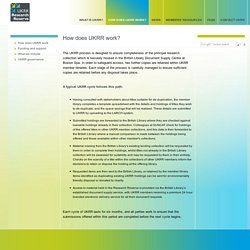
In order to safeguard access, two further copies are retained within UKRR member libraries. Each stage of the process is carefully managed to ensure sufficient copies are retained before any disposal takes place. A typical UKRR cycle follows this path: Having consulted with stakeholders about titles suitable for de-duplication, the member library completes a template spreadsheet with the details and holdings of titles they wish to de-duplicate, and the space savings that will be realised. These details are submitted to UKRR by uploading to the LARCH system. Each cycle of UKRR lasts for six months, and all parties work to ensure that the submissions offered within this period are completed before the next cycle begins.